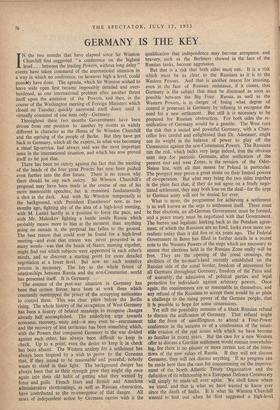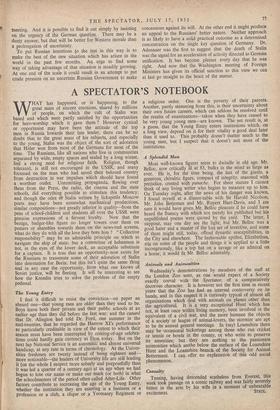GERMANY IS THE KEY
IN the two months that have elapsed since Sir Winston Churchill first suggested " a conference on the highest level .. . between the leading Powers, without long delay " events have taken command of the international situation in a way in which no conference, on however high a level, could possibly have done. The agenda, which Sir Winston wished to leave wide open first became impossibly detailed and over- burdened, as one international problem after another thrust itself upon the attention of the Powers, and then, in the course of the Washington meeting of Foreign Ministers which closed on Tuesday, quickly narrowed itself down until it virtually consisted of one item only—Germany.
Throughout these two months Governments have been driven from one position to another by events as widely different in character as the illness of Sir Winston Churchill and the uprising of the people of Berlin. But they have got back to Germany, which all the experts, in what was becoming a ritual lip-service, had always said was the most important issue in the international situation, and which has now proved itself to be just that. • There has been no outcry against the fact that the meeting of the heads of the four great Powers has now been pushed even further into the dim future. There is no reason why there should be any such outcry. Sir Winston Churchill's proposal may have been made in the course of one of his more memorable speeches, but it remained fundamentally a shot in the dark. And with Sir Winston temporarily in the background, with President Eisenhower now, as two months ago, fighting shy of the idea of a high-level meeting, with M. Laniel hardly in a position to force the pace, and with Mr. Malenkov fighting a battle inside Russia which probably means more to him at the moment, than anything going on outside it, the proposal has fallen to the ground. The best reason that could ever be found for a high-level meeting—and even that reason was never presented in so many words—was that the heads of States, meeting together, might find out which subjects were uppermost in each other's minds, and so discover a starting point for more detailed negotiation at a lower level. But now no such tentative process is necessary. The key to the whole future of relationships between Russia and the non-Communist world has presented itself. It is Germany.
The essence of the post-war situation in Germany has been that certain forces have been at work there which constantly outstripped the power of the occupying authorities to control them. This was clear years before the Berlin rising. The whole history of the occupation of West Germany has been a history of belated measures to recognise changes already half accomplished. The underlying urge towards economic recovery, unity and—it may even be—rearmament and the recovery of lost territories has been something which, with the Powers that conquered Germany in the war divided against each other, has always been difficult to keep in check. Up to a point, even the desire to keep it in check has been absent. The Western anxiety for a settlement has always been inspired by a wish to prove to the Germans that, if they intend to be reasonable and peaceful, nobody wants to stand in their light. The background danger has always been that as their strength grew they might slip once again into their old habit of getting what they wanted by force and guile. French fears and British and American administrative shortcomings, as well as Russian obstruction, have contributed to the re-emergence of that danger. All news of independent action by Germans carries with it the qualification that independence may become arrogance, and bravery, such as the Berliners showed in the face of the Russian tanks, become aggression.
But that is a risk that both sides must run. It is a risk which must be as clear to the Russians as it is to the Western Powers. And that is another reason for insisting, even in the face of Russian resistance, if it comes, that Germany is the subject that must be discussed as soon as possible between the Big Four. Russia, as well as the Western Powers, is in danger of losing what degree of control it possesses in Germany by refusing to recognise the need for a new settlement. But still it is necessary to be prepared for Russian obstruction. For both sides the re- unification of Germany would be a gamble. The West runs the risk that a united and powerful Germany, with a Chan- cellor less careful and enlightened than Dr. Adenauer, might use its weight in the balance of power to play off the Communist against the non-Communist Powers. The Russians run the risk, which bulks very large indeed, that the obvious next step for patriotic Germans, after unification of the present east and west Zones, is the revision of the Oder- Neisse line, with all that means for Poland in particular. The prospect may prove a great strain on their limited powers of co-operation. But what may bring the two sides together is the plain fact that, if they do not agree on a freely nego- tiated settlement, they may both lose on the deal—for the urge to German unity will not be denied for ever.
What is more, the programme for achieving a settlement is as well known as the urge to settlement itself. There must be free elections, an all-German Government must be formed, and a peace treaty must be negotiated with that Government. The barren and legalistic harking back to the Potsdam agree- ment, of which the Russians are so fond, looks even more un- realistic today than it did five or six years ago. The Federal Government in Bonn has filled in further details in a recent note to the Western Powers of the steps which are necessary to ensure that elections held in the Russian Zone really will be free. They are the opening of the zonal crossings, the abolition of the no-man's-land recently established on the Russian side of the zonal border, freedom of movement for all Germans throughout Germany, freedom of the Press and of assembly, the admission of political parties and legal protection for individuals against arbitrary powers. Once again, the requirements are so reasonable in themselves, and any refusal of the Russians to accept them would be so plain a challenge to the rising power of the German people, that it is possible to hope for some concessions.
Yet still the possibility remains of a blank Russian refusal to discuss the unification of Germany. That refusal might take the form of unwillingness to attend a Four-Power conference in the autumn or of a continuance of the miser- able evasion of the real issues with which we have become so familiar in recent years. But the case for a new Western offer to discuss a German settlement would remain overwhelm- ing, for there is no plainer or more certain test of the inten- tions of the new rulers of Russia. If they will not discuss Germany, they will not discuss anything. If no progress can be made here then the case for concentrating on the improve- ment of the North Atlantic Treaty Organisation and the definition of its relationship to a European Defence Community will simply be made all over again. We shall know where we stand, and that is what we have wanted to know ever since the death of Stalin. It is what Sir Winston Churchill wanted to find out when he first suggested a high-level Meeting. And it is possible to find it out simply by insisting concessions against its will. At the other end it might produce on the urgency of the German question. There may be a an appeal to the Russians' better nature. Neither approach dusty answer, but that will be better for Western morale than is as likely to have a solid practical outcome as a determined a prolongation of uncertainty. concentration on the single key question of Germany. Dr.
To put Russian intentions to the test in this way is to Adenauer was the first to suggest that the death of Stalin make the best of the new situation which has arisen in the was the signal for an acceleration of activity directed to German world in the past few months. An urge to find some unification. It has become plainer every day that he was way of taking advantage of that situation is steadily growing. right. And now that the Washington meeting of Foreign At one end of the scale it could result in an attempt to put Ministers has given its official sanction to this view we can crude pressure on -an uncertain Russian Government to make at last go straight to the heart of the matter.



























 Previous page
Previous page